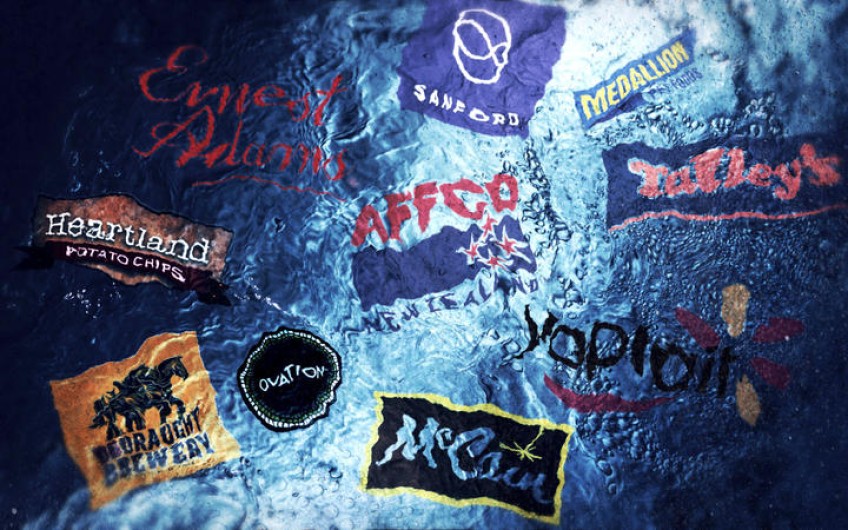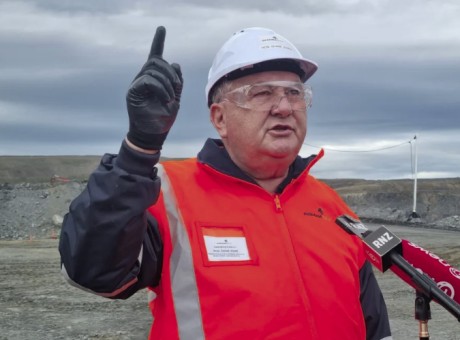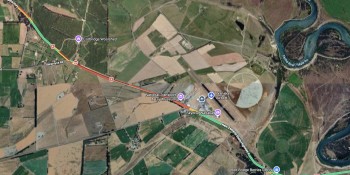Revealed: The companies dumping contaminants down the drain

Talleys, Ernest Adams and Yoplait are among hundreds of manufacturers and brands dumping contaminants into New Zealand's drains and getting away with it.
Frank van Betuw watches as blood red water and globs of yellow animal fat gush from Dunedin's sewers into the Green Island wastewater treatment plant. The visceral, greasy liquid will clog the filters and coat the ultraviolet lights used to disinfect the effluent. They'll have to be scrubbed clean, yet again.
Van Betuw knows where the wastewater comes from and he knows the company that dumped it down the drain isn't allowed to do it, but the Dunedin City Council senior compliance officer also fears it will happen again and again.
"It's been happening for many, many years," he says with a sigh.
The waste comes from a Mosgiel rendering factory a few kilometres up the road. Wallace Group's 'Keep It Clean' plant takes carcasses discarded from meatworks and boils and grinds them up to make tallow and animal meal for export.
The resulting wastewater must be treated at the factory to remove most of the blood, fat and animal parts before being poured into the sewer. But this doesn't always happen. That's when Van Betuw watches the effluent wreak havoc on the wastewater plant before it's sent out to sea off Dunedin's coast.
The same sorts of bloody, greasy scenes are playing out across New Zealand. Even once treated, the waste being dumped can destroy biodiversity - choking rivers, and wreaking havoc on marine life.
Hundreds of companies have dumped contaminants - like blood, fat, and toxic chemicals such as ammonia and sulphides - into sewers in breach of their trade waste consents over the past year, RNZ can reveal.
Some are bakeries, supermarkets and takeaway shops dumping the contents of their dirty grease traps. But some of New Zealand's biggest manufacturers and brands are also discharging contaminants - many of them dangerous - and most have breached the conditions of their consents multiple times.
The companies respond: read their full statements here
Data obtained from 68 city and district councils paints a grim picture of compliance, showing at least 270 companies have breached their conditions, while in several areas, compliance is rare or non-existent.
In Timaru, every trade waste consent holder has breached their conditions, while in Central Hawke's Bay, six of eight have done so. They include the seafood supplier, frozen vegetable and ice cream maker Talley's, and its meatworks subsidiary AFFCO. There's also the sustainable fishing company Sanford, DB Draught brewery, frozen foods manufacturer McCains, Heartland Potato Chips, Medallion Pet Foods, premium lamb producer Ovation and another of Wallace Group's rendering plants, South Canterbury By-Products.
In Palmerston North, eight of the nine consent holders have broken their consents multiple times, including two sites belonging to the dairy giant Fonterra, Goodman Fielder's Ernest Adams and Yoplait factories and the largest Māori-owned fishing company in the country, Moana New Zealand.
Some of the breaches are so unbelievable they are almost comical. Horowhenua District Council failed to meet consent conditions it imposed upon itself, by allowing Levin Landfill to discharge more leachate - a chemical-filled liquid heavy in ammonia and nitrogen that drains from the dump - than the wastewater treatment plant could cope with.
Even after forking out $28,606 in clean up costs to Tauranga City Council for trade waste breaches in 2019, upmarket pet food company ZiwiPeak racked up another 12 breaches last year, council records show.
But not every council keeps track of consent breaches in this way - or, if they do, is transparent about what they find.
In several regions, it's hard to get an accurate picture of how companies behave because councils don't have rules about what can be dumped into the sewers, rarely monitor dumping, or will not answer RNZ's questions.
Auckland Council's Watercare, which manages the largest wastewater network in the country, refuses to answer any questions about who has consents and who is breaching them because of "privacy reasons".
Many other councils simply don't know what's occurring because they test a company's wastewater as seldom as once a year, or leave it to the companies to monitor their own discharges.
Despite hundreds of consent holders dumping contaminants into the sewers in the past year, not a single one has been prosecuted. Councils can't stomach the cost of taking a prosecution under the Local Government Act or the Resource Management Act.
How many have been slapped with fines? None. A legal loophole means councils have no power to issue them, so are instead forced to take an "educative" approach with errant firms.
The upshot is hundreds of companies getting away with breaking the rules, and potentially damaging public infrastructure and polluting the environment. And RNZ can reveal successive governments have known about the issue for nearly two decades, but have done nothing to stop it.
There's a video on the Talley's Group website with the tagline "Bringing you the best of New Zealand." In it, fresh mussels are pulled out of pristine waters, fresh fish are stacked neatly in buckets of gleaming ice and smiling factory workers gently mix peas, corn and carrots on a production line into a quintessential family staple.
But are four of Talley's 17 factories doing their best when it comes to their waste? Test results obtained by RNZ show in the past year, Talley's Timaru fish processing plant has consistently discharged wastewater that's too alkaline, while its two Whanganui AFFCO plants have together breached their oil and grease limits a combined 190 times and their sulphide limits 519 times. (Whanganui City Council says while AFFCO has breached daily limits, it hasn't breached its consent as its discharge limits are averaged across a week and there are days AFFCO has been below as well as above its caps.)
Meanwhile, AFFCO's Napier meatworks has breached its consent 33 times in the two years to July 2020, though Napier City Council won't say how.
Due to a blocked pipe that Napier City Council is struggling to fix, waste from AFFCO's Napier site, along with that of 21 other trade waste consent holders, has, for the past five years, been diverted to the city's biological trickling plant, which is not designed to treat industrial waste. The partially-treated sewage is then being discharged into the sea off Napier's coast.
Talley's and its subsidiary AFFCO didn't respond to RNZ's repeated requests for comment.
Tasman Tanning is also causing issues at Whanganui's wastewater plant. Its website declares "Leather, it's in our nature" amid images of pristine landscapes and waterways, but it dumps too much chromium - a toxic heavy metal - into the sewer. In the past year, the company breached its chromium limits 205 times. It also clocked up 221 sulphide and 205 oil and grease breaches over that period.
The company admits it's at fault, though it says the high levels of grease and sulphides are "not much of an issue" for the Whanganui Wastewater Treatment Plant.
The high levels of chromium, however, are.
Tasman Tanning installed a special filter at the factory last year but it didn't work and the company is now spending $1 million on a new system to filter the chromium out of its wastewater.
Still, Tasman has doubts about the quality of the council's testing, saying it is carrying out its own tests because it doesn't believe it's breaching its consent as much as Whanganui District Council reports.
Meanwhile, the company's Timaru plant breached its consent 73 times between October 2019 and August 2020, including by dumping too much sulphide, zinc, chromium and ammonia down the drain.
Waste expert Tara Okan believes some industries deliberately push their consents close to the mark to maximise profits Photo: RNZ / Claire Eastham-Farrelly
Before Tara Okan was a waste expert, he was a professional magician, but even he can't magic up an easy solution to the country's sewage mess. It's "no surprise at all" that so many companies are breaching their consents, he says
"It's the reason we formed the New Zealand Trade and Industrial Waters Forum nine years ago. We recognised this as a huge problem."
With qualifications in freshwater ecology and marine zoology, Okan has been a trade waste advisor for more than two decades, working on some of the biggest wastewater projects in New Zealand and Australia.
This country's issue stems from ageing infrastructure and councils with little to no wastewater expertise, he says. Added to that are companies that don't know they're doing anything wrong and companies that do know, but don't care, Okan says.
"You have industries that deliberately push their consents so close to the mark to maximise profit, they're essentially cowboys running roughshod over our environment. They don't want to fix the problems, they want to maximise shareholder value."
Trade waste is typically only a small part of the total wastewater most councils deal with, but Okan says it's crucial it's monitored and dealt with correctly. However, the cost of a trade waste officer is something some smaller councils can't afford - or where they can, that person often has to multitask.
"I know one where they're monitoring the stormwater, the rainwater, the trade waste from abattoir, which damages their local wastewater plant, and is also responsible for the pigeons in the park," Okan says, his tone exasperated.
"Trade waste is usually a lot more toxic than the other things. And consequently even though it is a small complement, it can have a major impact. It can kill rivers."
Chemicals poured down the drain can produce sulphuric acid which can dissolve concrete infrastructure, he says, "So the expensive infrastructure you put in the ground at a minimum of $5000 a metre is now being eaten away and lost.
"Pipes burst… we've had situations where vehicles and people have been walking across the ground and actually fallen into pipes because they've collapsed underneath the ground."
Contaminated wastewater can kill microorganisms inside a wastewater treatment plant and suffocate creatures in the waterways where it's eventually discharged, as the contaminants suck up all the oxygen.
It's a huge problem - more than 100 wastewater treatment plants breached their consents in 2018-19, according to Water NZ.
"That is why the monitoring, treatment and the mitigation of trade waste is vitally important. It protects ratepayers' assets and it maintains life in our environment", Okan says.
For 18 years, Local Government New Zealand has been writing to ministers asking them to ammend the law
Another burst of white noise comes from another sigh of frustration - this time down a phone line from Wellington.
"To be honest... it annoys us greatly," Local Government New Zealand (LGNZ) principal policy advisor Mike Reid says .
He's explaining the loophole in the law that allows companies to get away with dumping their waste, knowing the council can't fine them and they're highly unlikely to face prosecution. Reid is frustrated that successive governments have failed to fix the error in the Local Government Act 2002 that prevents councils from enforcing their own bylaws with fines.
For the past 18 years, his organisation has written to every incoming local government minister urging an amendment to allow councils to issue fines to those that breach consents.
LGNZ President Stuart Crosby dispatched the latest letter just last month to Local Government Minister Nanaia Mahuta and Environment Minister David Parker and reminded them officials have been fobbing off concerns for 18 years.
"It is an issue that LGNZ has raised with multiple governments since 2002, but with no success," the letter reads.
He signs off the missive: "We write to both of you because until councils are able to infringe breaches of, for example, trade waste bylaws, there will continue to be adverse effects on the quality of our freshwater."
The Act was always supposed to give councils the power to issue fines of up to $200,000 for trade waste consent breaches.
"The ability to have an infringement fine was an essential way to being able to change behaviours without a lot of bureaucratic waste of time," Reid says.
But after the Act passed and the regulations were being written up, Crown Law discovered a problem.
"What we had intended was that there would be one regulation that would be applied to every bylaw made under the Act… The way the legislation was written, it actually required regulation to be written for every bylaw a council wished to use. Given there are 78 councils… if a regulation was needed for every bylaw adopted...it would be totally, utterly impractical," he says.
And repeated pleas to tidy up the Act so the rules could be carried out as intended have fallen on deaf ears.
"We've not succeeded in getting this through. It was just not a priority for governments," Reid says.
New ministers prefer to tackle the "big sexy stuff" they can stamp their name on, according to Reid's colleague at LGNZ, Clare Wooding. "But actually, what we really need is someone to fix up the day-to-day, practical stuff that councils need to be able to improve the wellbeing of their communities."
At one point, LGNZ got so "desperate" it drafted a private members' bill for National's Palmerston North MP Jono Naylor to drop in the ballot box. "But his caucus never agreed to it," Reid says.
When LGNZ surveyed councils three years ago, one of the key issues raised was the need to fine for trade waste breaches, Wooding says.
"We still get regular correspondence from council officials along the lines of 'when is this going to be fixed?"
Local Government Minister Nanaia Mahuta says she is not clear fines are always effective in changing behaviour Photo: RNZ / Dom Thomas
If they're waiting for Local Government Minister Nanaia Mahuta to ride to the rescue, they may be waiting a while. Though she has held the portfolio since 2017, when asked about the issue, she seemed perplexed, telling RNZ she'd "have to seek some advice". When asked why, the Minister said it was a concern that had only "just been raised with me".
Her reply to LGNZ's latest plea, sent just 10 days ago, is more telling.
"While I recognise that the law is not working as well as it could, it is not clear to me that infringement offences are always effective in changing behaviour."
Bylaws, Mahuta says, give councils flexibility to establish rules suited to their circumstances in order to control behaviour in public spaces from shopping malls, sports fields to cemeteries.
"This flexibility does not sit well with the power to decide guilt and impose potentially significant penalties without a Court process. It is my view that careful consideration should be given before extending these powers," she writes.
Michael Lovett Photo: Supplied
The Minister's key adviser on the matter, Department of Internal Affairs Deputy Chief Executive of Local Government Michael Lovett, also seems unconvinced a law change is needed. Why change the legislation when you could change the infrastructure?, he argues.
Although it's never been done, councils can prosecute those who break bylaws, he says, though he accepts that to do so can be complex and expensive.
"But it's important to balance from a compliance approach your promotional or education work with the use of a strong signal to commercial operators about acceptable standards of behaviour."
Building bigger and better wastewater treatment plants so they can cope with large amounts of contaminated wastewater is a much better solution, he says.
"I totally accept that the issues with trade waste are playing into an already stressed system of infrastructure. But one of the fundamental issues that requires attention is reforming the way that we organise and pay for that infrastructure."
The government's 'Three Waters' reforms, currently underway, will help councils pay for these upgrades, he says. But the country's new water regulator, Taumata Arowai, created to oversee these reforms, will not monitor wastewater networks for at least two more years.
Lovett is at a loss to explain why nothing was done prior.
"Yeah...that's a really good question," he says before pausing to think.
"Local authorities are always balancing a bunch of difficult problems. On one hand they want to attract business… they want to create jobs. But it creates cost for the underlying infrastructure.
"What they have to wrestle with is the necessary investments in the infrastructure upgrades and the rates that get charged to these new businesses, with a desire to get them in and have them as part of their economy."
Bay of Plenty Regional Council's compliance manager Alex Miller sees the impact of those decisions all too often.
The pressure to attract industry and jobs into a region can result in trade waste consents being approved even though the council knows its wastewater plant can't handle them, he says.
"In our region we see it from time to time. We've got two cases at the moment which are linked to that."
He convenes a group of regional council compliance managers and they factor this in when deciding whether to prosecute local councils that have discharged contaminated effluent from a wastewater plant, after consent breaches from industry further up the line.
Councils could choose to stop taking wastewater from factories that consistently break the rules, he says, though he admits that's easier said than done.
Trade waste officers, who RNZ agreed not to name, say big industry will quickly get on the phone to elected councillors if their business operations are threatened.
That concerns Tara Okan.
"We have situations where the local fish and chip shop gets fined for not cleaning its grease trap in time, but the big industry in town gets left alone because they're a major employer."
Trade waste officers are being prevented from doing their jobs, he says.
"We have got cases where trade waste officers have been asked to stand down and when they wouldn't, they've been moved out of their jobs".
Some businesses compare councils' trade waste rules then play them off against each other, Okay says.
"I know that industries have said 'if you don't let us do this we'll move to another town and you'll lose all this work''.
"If we had national standards of discharge this would relieve the pressure. Basically they can no longer bully councils."
He'd like to see the Environmental Protection Agency set and monitor such standards, with exceptions granted for certain industries and audited by the government agency, he says.
It's an old idea. The Trade and Industrial Waters Forum, a voluntary organisation, has been advocating for this for nearly a decade. Though they're yet to succeed, it's an idea Okan says can't be abandoned.
"The environment is all we've got. Everyone has to be able to use the water we have here... Not just one or two big players on a river who pollute it. It's for everybody."
Back in Dunedin, Wallace Group admits its Mosgiel and Timaru factories have been non-compliant for years. Attempts to fix its wastewater treatment have frequently failed, says operations manager Manfredo Hintze.
"This has been a weak spot in our systems."
The company has installed and is fine-tuning new equipment at the Timaru plant, South Canterbury By-Products, to ensure it meets its consent limits. Similar work will be completed at the Mosgiel Keep It Clean plant by the end of next month .
While that will be welcome news to Dunedin City Council's Frank van Betuw, he'd like to know he could fine Wallace Group - or any other company - that dumps again.
"The threat of a fine would make the job a lot easier," he says.





















